flash
Bell tolls 25 times in memory Chernobyl nuke diaster
Updated: 2011-04-26 09:23
(Agencies)
|
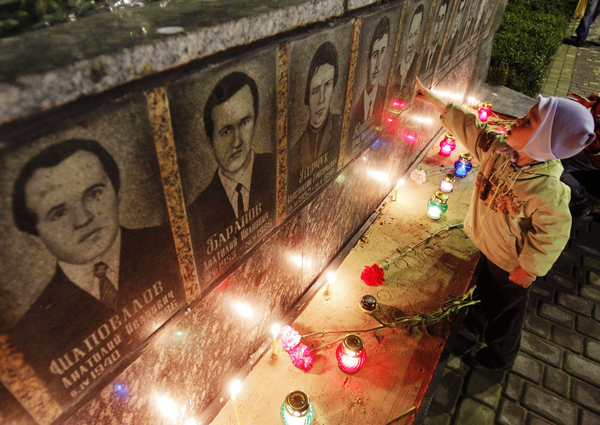 A boy looks at a portrait of his grandmother as he visits a memorial dedicated to firefighters and workers who died after the Chernobyl nuclear disaster during a night service near the Chernobyl plant in the city of Slavutych April 25, 2011. Belarus, Ukraine and Russia will mark the 25th anniversary of the Chernobyl disaster, the world's worst civil nuclear accident.[Photo/Agencies]
|
KIEV, Ukraine -- Black-clad Orthodox priests sang solemn hymns, Ukrainians lit thin wax candles and a bell tolled 25 times for the number of years that have passed since the Chernobyl disaster as the world began marking the anniversary Tuesday of the worst nuclear accident in history.
Russian Orthodox Patriarch Kirill led the service near a monument to firefighters and clean up workers who died soon after the accident from acute radiation poisoning.
"The world had not known a catastrophe in peaceful times that could be compared to what happened in Chernobyl," said Kirill, who was accompanied by Ukraine's Prime Minister Mykola Azarov and other officials.
"It's hard to say how this catastrophe would have ended if it hadn't been for the people, including those whose names we have just remembered in prayer," he said in an emotional tribute to the workers sent to the Chernobyl plant immediately after one of its reactors exploded.
Tuesday's service began shortly after midnight, the same time as the blast on April 26, 1986, that spewed a cloud of radioactive fallout over much of Europe and forced hundreds of thousands from their homes in the most heavily hit areas in Ukraine, Belarus and western Russia.
The disaster did not become public knowledge for several days, because officials released no information until 72 hours after the accident.
The explosion released about 400 times more radiation than the US atomic bomb dropped over Hiroshima. Hundreds of thousands were sickened and once-pristine forests and farmland still remain contaminated. The UN's World Health Organization said at a conference in the Ukraine capital Kiev last week that among the 600,000 people most heavily exposed to the radiation, 4,000 more cancer deaths than average are expected to be eventually found.
"Our lives turned around 360 degrees," said Larisa Demchenko, 64. She and her husband both worked at the plant, and he died nine years ago from cancer linked to Chernobyl radiation.
"This was a wonderful town, a wonderful job, wonderful people. It was our youth. Then it all collapsed," she said. "If only you knew how much our hearts ache for our children, how many sick grandchildren there are, how many couples without kids.
"We come here to look each other in the face. If it hadn't been for the people buried here, Kiev would no longer exist," Demchenko said.
Russia, Ukraine and Belarus have cut the benefits packages for sickened cleanup workers in recent years, and many workers complained directly to Russian President Dmitry Medvedev as he handed them awards for their work at a ceremony Monday in Moscow.
Officials in Bryansk, the Russian region most contaminated by the disaster, have failed to make necessary repairs at the local cancer hospital, worker Leonid Kletsov told the president.
"It's the only place of rest for us," he said. "Officials promised to renovate it, but these promises are still promises."
Chernobyl has come into renewed focus since an earthquake and tsunami triggered a nuclear disaster in Japan last month, with the country still struggling to bring the radiation-spewing Fukushima Dai-ichi nuclear plant under control.
Japanese newspapers on Monday highlighted the significance of Chernobyl The Asahi interviewed a former Chernobyl worker under the headline: "Fukushima, don't tread the same route."
In Germany, thousands of people demonstrated on Monday near several nuclear power plants, demanding a speedy end to the use of atomic energy. Japan's crisis has prompted Germany to freeze plans to extend the life of its plants, order a temporary shutdown of its seven oldest reactors and seek a quicker transition to renewable energy.
In Austria, Chancellor Werner Faymann used an event in Vienna marking the 25th anniversary of Chernobyl to call for a nuclear-free Europe.
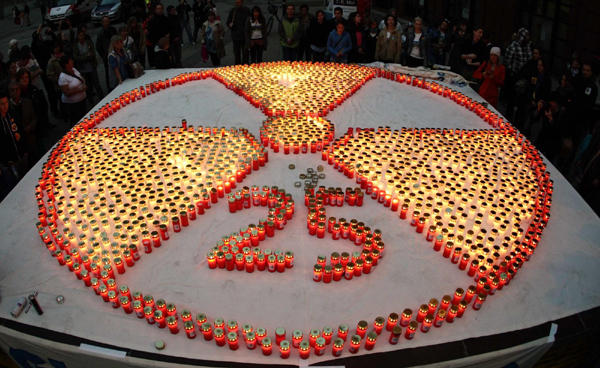 Some 2,000 candles are lit to display a nuclear radiation warning sign during an anti-nuclear rally in Vienna April 25, 2011, on the eve of the 25th anniversary of the Chernobyl meltdown. [Photo/Agencies] |
E-paper
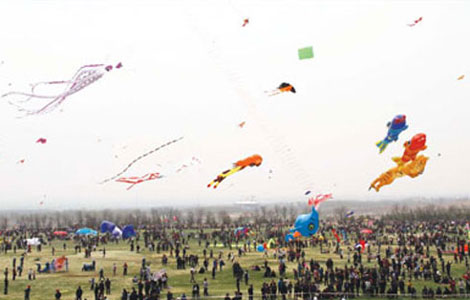
Blowing in the wind
High-Flyers from around the world recently traveled to home of the kite for a very special event.
Image maker
Changing fortunes
Two motherlands
Specials

Models gear up car sales
Beauty helps steer buyers as market accelerates.
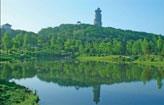
Urban breathing space
City park at heart of Changchun positions itself as top tourism attraction
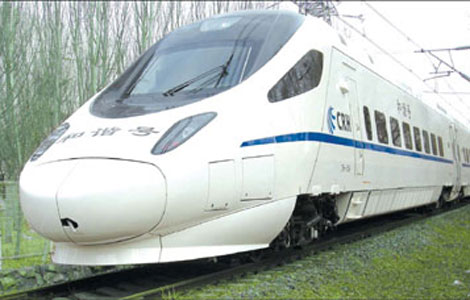
On a roll
Auto hub Changchun also sets its sight on taking lead in railway sector




